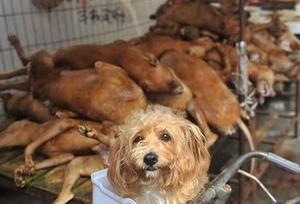 Ethical and food safety concerns are being voiced over the event, with about 10,000 dogs due to be slaughtered on Friday.
Ethical and food safety concerns are being voiced over the event, with about 10,000 dogs due to be slaughtered on Friday.But a spokesman for the Yulin city government, who asked not to be identified, said the event is organized by local residents and the government has no right to stop it.
Shi Guoliang, an artist known for his painting, Maid and Dog, said: "Dogs are man's best friend. They can share our happiness and sorrows. It's cruel and disgusting even to think about eating them."
However, people in Guangxi are not happy with the protests from outsiders.
Wei Huan, from Guilin, said she has grown up eating dog meat, which she considers "the tastiest dish".
"What is wrong with that?" asked the 27-year-old. "Why do we have to follow their (the protesters') likes and dislikes?"
Residents organize the event each year to mark the summer solstice, and love to eat the meat with litchis, which they believe balances yin and yang, the city government spokesman said.
However, apart from ethical concerns, food safety remains a huge issue in the dog meat industry, as there are no quarantine inspections for dog meat, according to Guo Peng, a professor of animal protection at Shandong University.
Guo said that through her own investigations she found most dogs sold to restaurants are stolen from households or abducted from the streets.
She said there are three major bases for underground dog theft and slaughtering in Jiangsu, Jilin and Guangdong provinces.
Guo asked restaurants how they obtained the dogs and was told they came from farms. However, when she searched for such farms, she found nothing.
The market price of dog meat is 25 yuan ($4) for 500 grams, half the price of lamb.
"The cost of raising dogs is actually much higher than raising sheep," said Liu Lang, director of the Beijing Small Animal Veterinary Association.
"Think of this, if the dogs are raised in farms, how can their meat cost less than lamb?"
He said that in 2011 he and other volunteers saved a truckload of more than 500 dogs on the Beijing-Harbin expressway. "Most of the dogs saved were pet breeds and were seriously injured," Liu said.
The Ministry of Agriculture issued a quarantine regulation on dogs and cats on April 22, requiring laboratory quarantine for these animals before they are transported.
Liu said if the regulation is strictly enforced, the illegal trading of dogs and cats can be prevented.
However, after the regulation took effect, Liu visited Peixian county in Jiangsu province, the largest dog meat processing base in China, and found the source of supply remained questionable.
The Yulin government spokesman did not deny the allegation that dogs are transported from outside the region, and said it will take stricter measures to tackle illegal dog trading and the food security issue.





